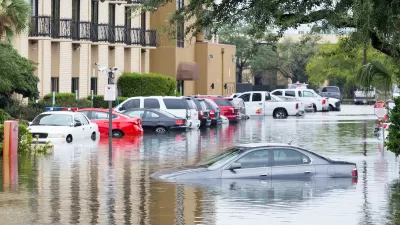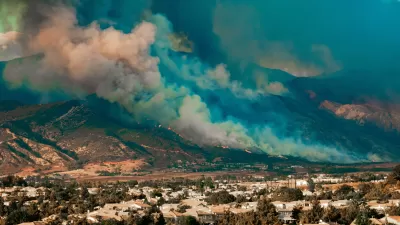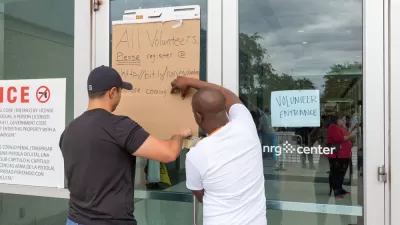From wildfires to hurricanes, environmental risks pose a threat to around 40 percent of U.S. rental units.

More than 17 million rental units across the United States are at risk of "substantial annual losses" from environmental hazards, warns the Joint Center for Housing Studies' American Rental Housing 2022 report. According to Sophia Wedeen, who outlines the report's findings, this represents about 40 percent of total occupied rental units in the country.
"Areas with substantial expected annual losses are geographically widespread, reflecting the variety of acute and chronic environmental hazards that impact every part of the country." While California and the West Coast face high wildfire risks, Gulf Coast states are threatened by hurricanes and flooding. "California has the largest number of rental units at risk, with 4.5 million rentals (76 percent of the state’s occupied rental stock) located in census tracts with at least moderate expected annual losses due to likely hazards."
Wedeen notes that renters in manufactured homes are at especially high risk. "Manufactured units are also more likely to be classified as structurally inadequate by HUD than other types of rental units, and therefore may be especially vulnerable to loss due to hazards."
As the effects of climate change worsen, some rental units will become uninhabitable, requiring a "massive federal and local investment" to preserve and adapt existing stock, says the report. "In the short term, damage from hazards will almost certainly drive up the cost of repairing and rebuilding rental units. Reducing the time to build replacement rental housing after a natural disaster and increasing the availability of post-disaster financial assistance for renters are both urgent priorities."
FULL STORY: THE THREAT OF ENVIRONMENTAL HAZARDS TO THE RENTAL STOCK

Maui's Vacation Rental Debate Turns Ugly
Verbal attacks, misinformation campaigns and fistfights plague a high-stakes debate to convert thousands of vacation rentals into long-term housing.

Planetizen Federal Action Tracker
A weekly monitor of how Trump’s orders and actions are impacting planners and planning in America.

San Francisco Suspends Traffic Calming Amidst Record Deaths
Citing “a challenging fiscal landscape,” the city will cease the program on the heels of 42 traffic deaths, including 24 pedestrians.

Defunct Pittsburgh Power Plant to Become Residential Tower
A decommissioned steam heat plant will be redeveloped into almost 100 affordable housing units.

Trump Prompts Restructuring of Transportation Research Board in “Unprecedented Overreach”
The TRB has eliminated more than half of its committees including those focused on climate, equity, and cities.

Amtrak Rolls Out New Orleans to Alabama “Mardi Gras” Train
The new service will operate morning and evening departures between Mobile and New Orleans.
Urban Design for Planners 1: Software Tools
This six-course series explores essential urban design concepts using open source software and equips planners with the tools they need to participate fully in the urban design process.
Planning for Universal Design
Learn the tools for implementing Universal Design in planning regulations.
Heyer Gruel & Associates PA
JM Goldson LLC
Custer County Colorado
City of Camden Redevelopment Agency
City of Astoria
Transportation Research & Education Center (TREC) at Portland State University
Jefferson Parish Government
Camden Redevelopment Agency
City of Claremont





























